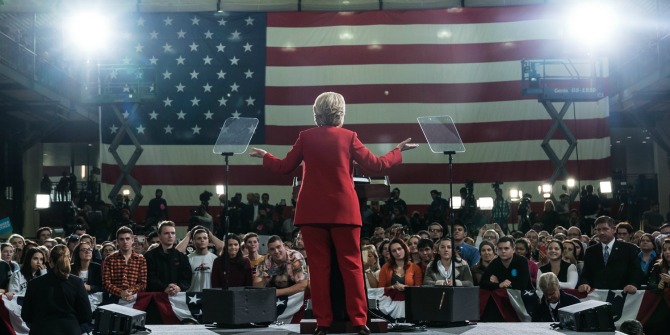 Today primary voters go to the polls in Michigan, one of the first big blue-collar industrial states to vote in the 2016 primary season. US Centre Director Peter Trubowitz writes that the vote in the Great Lakes State will preview how Donald Trump’s campaign will perform in similar states with many delegates in play later this month, such as Ohio and Illinois. On the Democratic side, he comments that with Hillary Clinton’s recent primary successes, it comes as little surprise that former New York Mayor, Michael Bloomberg has decided not to mount a third party challenge, as many had hoped.
Today primary voters go to the polls in Michigan, one of the first big blue-collar industrial states to vote in the 2016 primary season. US Centre Director Peter Trubowitz writes that the vote in the Great Lakes State will preview how Donald Trump’s campaign will perform in similar states with many delegates in play later this month, such as Ohio and Illinois. On the Democratic side, he comments that with Hillary Clinton’s recent primary successes, it comes as little surprise that former New York Mayor, Michael Bloomberg has decided not to mount a third party challenge, as many had hoped.
What will I be looking for in Michigan today?
I think the big story is on the Republican side. The key issue is how well Donald Trump and Ohio Governor John Kasich do in Michigan — a big blue-collar industrial state that has been hurt badly by globalisation, wage stagnation, unemployment, and so on. What I’m looking to see is how well Trump’s economic message resonates with Republican voters there. It’s the state with most delegates up for grabs today (59) and if it goes strongly for Trump, it should tell us something about how well his campaign is likely to perform in the big industrial states like Ohio, Illinois and Pennsylvania that will be voting in coming weeks.
The Kasich dynamic
The polls suggest that he is making up ground in Michigan and closing fast on Trump in his neighboring home state of Ohio. If he places a strong second in Michigan and then beats Trump in Ohio on March 15, we could be looking at a new dynamic in the race. A lot of ‘ifs’ but as I’ve said before, Kasich is the sleeper in this race. Marco Rubio, the darling of the Republican establishment, is on the ropes: his voters are now defecting to Cruz and Kasich. Indeed, Cruz smells blood and is pouring resources into Florida in hopes of preventing Rubio from winning his home state, a death knell in primary elections.
Can ‘cruisin’ Ted Cruz win in northern states?
Yes, Cruz has been coming on strongly lately. While he underperformed on Super Tuesday, he did well enough and especially, over this past weekend, in Kansas and Maine’s caucuses to win the mainstream media’s pick as the Republican’s best hope to stop Trump. However, the question for the Texas Senator going forward is whether he can win in northern states like Michigan where evangelical voters, his core consistency, do not make up a decisive slice of the Republican primary electorate. If Cruz were to beat Trump in Michigan, that would tell us that his message has broad appeal. Don’t hold your breath.
Clinton’s successes have closed off Bloomberg
Bernie Sanders is coming off a good weekend of caucus victories in Kansas, Nebraska, and Maine and he will pick up delegates in Michigan, though likely not enough to put much of a dent in Clinton’s lead for the Democratic nomination. What I’ll be looking for in Michigan is how the Democratic vote shakes out. Clinton is likely to score big among African-American voters, as she did on Super Tuesday. The question is whether Sanders will continue to outscore her among white voters, especially white males. This has been a problem for Clinton throughout the campaign and if she wins the nomination, it could prove to be a big vulnerability in a general election campaign.
Does the former New York Mayor, Michael Bloomberg’s decision not to run change anything?
Not really. Once Clinton turned things around in South Carolina, the path forward for Bloomberg started to fade. He needed a Sanders-Trump set up to position himself as the moderate alternative and guarantee a large enough number of Electoral College votes. Clinton’s victories on Super Tuesday all but closed that off. His announcement yesterday that he would not run was just a belated acknowledgment of the steep electoral climb he faced if he got into the race.
Featured image credit: Brad Wilson (Flickr, CC-BY-NC-SA-2.0)
Please read our comments policy before commenting.
Note: This article gives the views of the author, and not the position of USAPP – American Politics and Policy, nor the London School of Economics.
Shortened URL for this post: http://bit.ly/1SwG6Ju
_________________________________
About the author
 Peter Trubowitz – LSE US Centre
Peter Trubowitz – LSE US Centre
Peter Trubowitz is Professor of International Relations, and Director of the LSE’s US Centre. His main research interests are in the fields of international security and comparative foreign policy, with special focus on American grand strategy and foreign policy. He also writes and comments frequently on U.S. party politics and elections and how they shape and are shaped by America’s changing place in the world.






